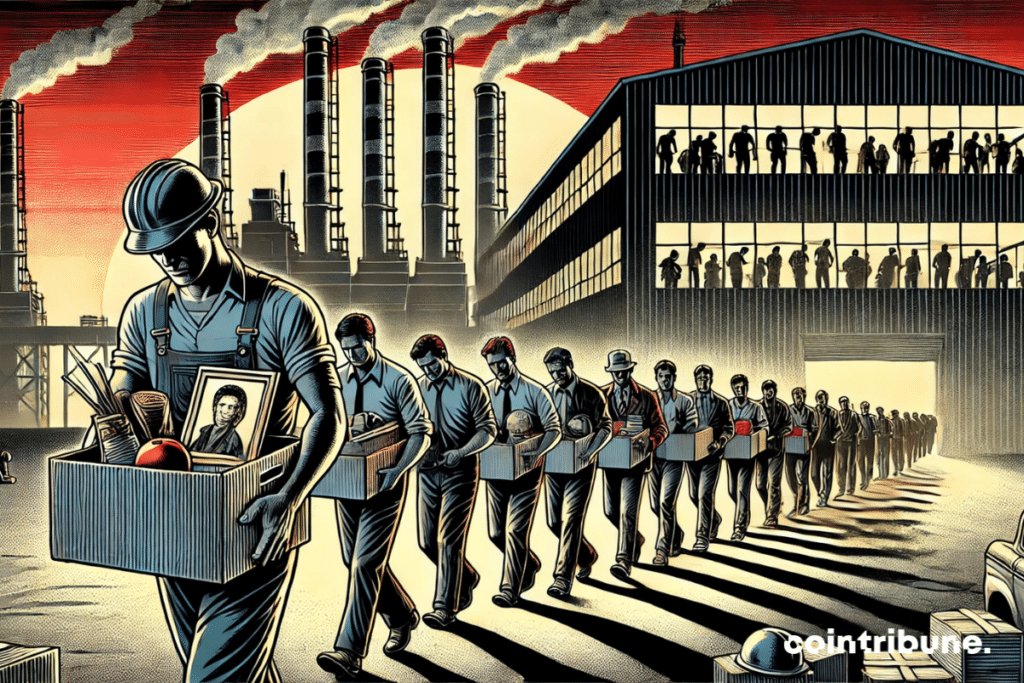Gazprom’s 40 % Workforce Reduction Marks A Turning Point
In a world where energy shapes geopolitical power dynamics, the crisis afflicting Gazprom reveals the fractures of a once unshakeable giant. A pillar of the Russian economy and a strategic tool of the Kremlin, the group is facing a brutal drop in its revenues, exacerbated by the loss of its European markets and international sanctions. Now forced to reduce its workforce to a historic low, Gazprom finds itself at a decisive stage, where its strategic choices will determine not only its future but also that of the Russian economy.

A historic restructuring plan for Gazprom
Gazprom’s management has announced a historic 40 % reduction in the administrative staff at its headquarters in Saint Petersburg, decreasing from 4,100 to 2,500 positions. This measure, detailed in an internal letter written by Elena Ilioukhina, vice-chairperson of the board, reflects a major change for the company, which had until then been distinguished by continuous growth. The decision was confirmed by Sergei Kupriyanov, spokesperson for Gazprom, who nonetheless refused to provide further details. He stated that “we do not comment on internal procedures.”
These job cuts are part of a profound economic crisis for the Russian gas giant. In 2023, Gazprom recorded a net loss of $7 billion, the first in over two decades. Numerous factors explain this unprecedented situation, notably the halt of gas transit through Ukraine, a measure taken by Kiev to reduce Moscow’s revenues in response to the war. Additionally, the loss of the German market, a direct consequence of the sabotage of the Nord Stream pipelines in 2022, deprived Gazprom of significant revenues. These combined events illustrate the scale of the challenges the group faces, both economically and strategically.
Between sanctions and market reconfiguration
Gazprom is also facing the devastating impact of international sanctions imposed by Western powers. Among the most significant measures are the restrictions targeting Gazprombank, the group’s main financial lever, as well as sanctions against its oil subsidiary, Gazprom Neft. These initiatives, combined with the loss of its European market (once a major source of revenue), have increased pressures on the group’s liquidity, already weakened by a hostile economic environment.
In light of this situation, Gazprom is striving to redirect its exports to new markets in Asia, primarily in China and India. Although this strategic reorientation opens up diversification prospects, it remains insufficient to compensate for the massive losses suffered in Europe. Meanwhile, Russia’s critical dependence on energy revenues highlights the vulnerability of its economy to prolonged disruptions. According to experts, this combination of sanctions and reconfigured markets could exacerbate internal tensions within Gazprom while weakening an already fragile energy ecosystem affected by global energy price fluctuations.
The crisis shaking Gazprom extends far beyond the company’s borders, as it reveals the profound flaws of a Russian economic model based on excessive dependence on hydrocarbons. As Western sanctions and the loss of European markets disrupt its balances, Moscow is attempting to redirect its exports to Asia. However, this strategy, while indispensable, struggles to compensate for the colossal losses incurred and sheds light on the challenges of a still uncertain economic transition. For Russia, this situation could represent a major turning point, between the need to redefine its economic priorities and the risk of eroding its influence on the international stage.
Maximize your Cointribune experience with our "Read to Earn" program! For every article you read, earn points and access exclusive rewards. Sign up now and start earning benefits.
Diplômé de Sciences Po Toulouse et titulaire d'une certification consultant blockchain délivrée par Alyra, j'ai rejoint l'aventure Cointribune en 2019. Convaincu du potentiel de la blockchain pour transformer de nombreux secteurs de l'économie, j'ai pris l'engagement de sensibiliser et d'informer le grand public sur cet écosystème en constante évolution. Mon objectif est de permettre à chacun de mieux comprendre la blockchain et de saisir les opportunités qu'elle offre. Je m'efforce chaque jour de fournir une analyse objective de l'actualité, de décrypter les tendances du marché, de relayer les dernières innovations technologiques et de mettre en perspective les enjeux économiques et sociétaux de cette révolution en marche.
The views, thoughts, and opinions expressed in this article belong solely to the author, and should not be taken as investment advice. Do your own research before taking any investment decisions.